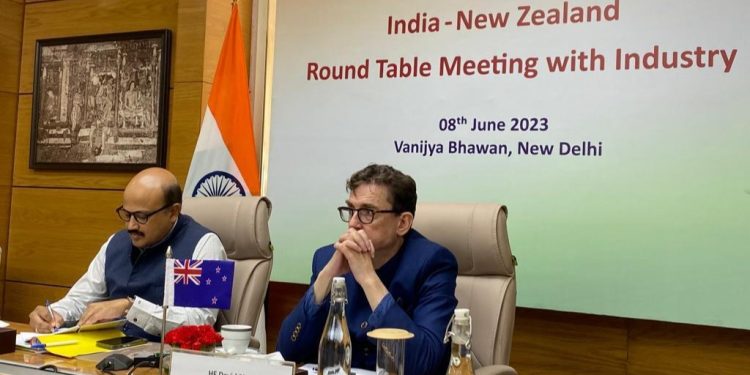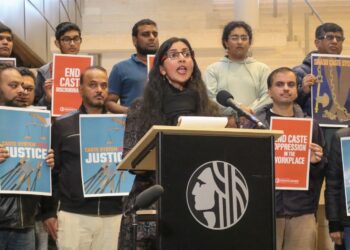India and New Zealand, in a bid to enhance their collaboration, have agreed to focus on several key areas, including the facilitation of the UPI system, expeditious resolution of trade issues, work visas, and the strengthening of banking relations. Recognising the significant potential and the need for synergy in bilateral trade, both countries have expressed their commitment to fostering improved economic cooperation in areas of shared interest.
At the inaugural Round Table Joint Meeting held in Delhi between India and New Zealand, industry organisations from both nations engaged in discussions exploring potential avenues for cooperation. The deliberations also emphasised the advancement of objectives outlined by the Joint Trade Committee (JTC), established under the framework of the Bilateral Trade Agreement of 1986.
In an official statement released by the Ministry of Commerce and Industry, it was revealed that the Round Table Joint Meeting was co-chaired by Rajesh Agarwal, the Additional Secretary of the Department of Commerce, and David Pine, the High Commissioner of New Zealand in India. The ministry’s release highlighted the consensus reached during the meeting, stating, “It was a common understanding that there is a need to work beyond any free trade agreement and explore other areas where both can complement each other.”
During his remarks, the New Zealand High Commissioner underscored the significance of collective efforts while adhering to the principles of mutual benefits, proportionality, trade facilitation, and cooperation with private sectors.
The Ministry of Commerce further outlined specific areas explored by the High Commissioner, including the promotion of the Unified Payment Interface (UPI) system, cooperation in carbon credits, sectoral arrangements for economic cooperation, and joint efforts in addressing specific issues such as the comprehensive proposal put forth by Zespri. Additionally, there was a focus on prioritising requests related to non-tariff measures for the mutual benefit of businesses on both sides.
Highlighting another significant aspect, the New Zealand High Commissioner also drew attention to the publication of a report titled “India New Zealand – Relationship ready for next phase” by the India-New Zealand Business Council in April.
The report outlined potential areas of economic growth, further underscoring the importance of fostering bilateral relations. Additionally, the High Commissioner emphasised the need for enhancing air connectivity links between the two nations to facilitate smoother trade and cooperation.
Rajesh Agarwal, during the meeting, emphasised the strengthening of the existing institutional framework to promote bilateral trade. He stressed the importance of establishing a framework that addresses collaborative issues and cooperation. Agarwal suggested the creation of a working group, led by Joint Secretaries, to tackle specific identified issues.
Once ideas and corresponding cooperative activities are solidified, they can be expanded and finalised during the Joint Trade Committee meeting. Agarwal further emphasised the necessity of coordinated efforts between both countries, taking into consideration decisions made during governmental-to-governmental (G2G), business-to-business (B2B), and government-to-business (G2B) interactions.
Commending the constructive nature of the discussions, the Additional Secretary expressed satisfaction with the “tentative identification of various areas of cooperation.” These areas include the facilitation of the Unified Payment Interface (UPI) system, collaboration on carbon credits, the package proposal concerning Kiwi fruits, the establishment of a trans-shipment hub, prioritisation of timely resolution of bilateral trade issues, cooperation on technology matters, addressing work visa-related concerns, further strengthening banking relations, and more.
Recognising the need for a proactive operational structure that would yield mutual benefits, the Additional Secretary emphasised the formation of working groups. These groups would play a crucial role in providing substantial ideas and solutions to the Joint Trade Committee, fostering effective collaboration between India and New Zealand.
During the meeting, industry representatives from India engaged in discussions regarding bilateral issues and highlighted the immense potential and numerous opportunities that exist between the two economies.
These interactions and actions were deemed essential for cultivating stronger ties. The representatives from the Indian industry hailed from various sectors, including IT and ITeS, logistics, banking, as well as manufacturing sectors such as food processing, pharmaceuticals, automobile, construction, and power, as per the Commerce Ministry.
The industry organisations from New Zealand acknowledged the significance of this meeting as a pivotal turning point in the economic relations between the two countries. They emphasised the importance of swift action and maintaining an organised approach to the ongoing discussions.
Both India and New Zealand unanimously agreed on the necessity of more government-to-industry dialogues, recognising the potential for mutual benefits that can be derived from such engagements.











